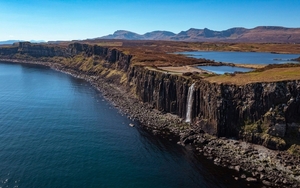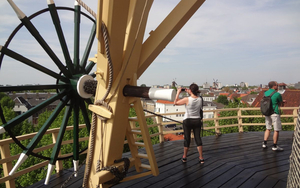DARKNESS visible. This is one of the darkest pieces of theatre you might ever see. If there was humour it was cry out loud.
I find no humanity in imagining an end to humanity.
The Skriker is directed by Sarah Frankcom and is about the eponymous shapeshifting spirit played by Maxine Peake - the pair worked together on a standout production, The Masque of Anarchy, in the 2013 Manchester International Festival.
Peake is apt here as nobody shapeshifts quite like her in British luvvieland at present. She's shifted from put-upon Veronica Fisher in Shameless, to murderess Myra Hindley in See No Evil to the Prince of Denmark in you-know-what and now she's a morally ambiguous, jealous, fickle, bloodthirsty, and very damaged faerie.
As usual Peake seems to have climbed so deeply into this role you wonder how she shifts back to normality after each show. She gives a deliberately disturbing performance in this early '90s play by Caryl Churchill that comes complete with some of the most complex lines any actor will ever have to remember. The glum-thrilled fun-filled hate-crime Man-crime faerietastic opening monologue is truly something to behold in a coal-seam jetstream unclean eco-theme kinda way. That last sentence was my poor attempt at parody of the way The Skriker speaks. It takes some getting used to.
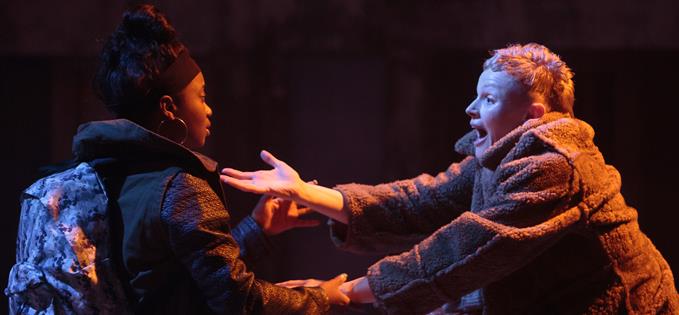 The Skriker, Maxine Peake, right, with Lily, Juma Sharkah
The Skriker, Maxine Peake, right, with Lily, Juma SharkahThe play attempts several things at once. We have the supernatural Skriker shifting from genuine friend to older woman to disturbing child to a young male lover and back again, as she inveigles herself with a pair of vulnerable young mothers Josie (well-played by Laura Elsworthy) and Lily (more subdued from Juma Sharkah). Lily is pregnant and has the baby. It appears Josie has killed her baby - a lost girl wanders about throughout the performance, which might or might not be her child.
The play opens in an asylum with Josie behind bars. The lower tier of the Royal Exchange has been turned into an asylum and is comprehensively grey. Audience members sit at tables on the stage floor and are included in the performance. Windows open from the asylum walls into sunnier, brighter worlds. The story of these fragile girls smack up against the grand environmental theme of the human despoilation of the Earth and the Skriker's fury at this and its delight in pile-ups, war and anything which harms humans - despite the Skriker's pathetic desire for the young women to love him/her/it.
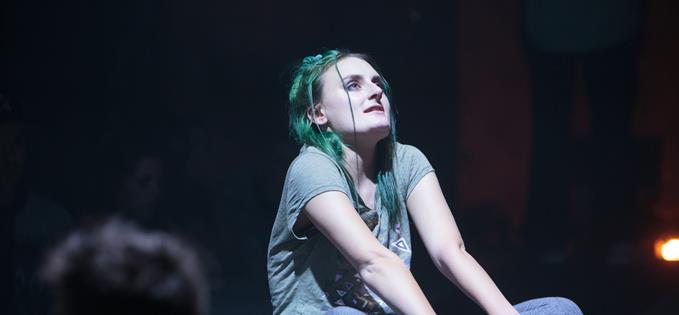
Josie played by Laura Elsworthy
The big set pieces in the play are exhilarating, especially the hideous feast and dance in Faerieland - the faery called Rawheadandbloodybones is especially entertaining. The tricksy nature of the faeries and the Skriker in particular is caught well by Frankcom. Anybody familiar with the recent BBC production of Jonathan Strange and Mr Norrell would recognise the capricious nature of the faerie Thistledown in the supernatural characters.
The problem with the production is not Peake nor the exuberant cast, but the material.
Caryl Churchill must have been lost in her own faerieland when she wrote the play. As with the nasty film, Avatar, humans are no good, unless they become less human. The Skriker, says she comes from 'long before England was an idea, a country of snow and wolves where trees sang and birds talked and people knew we mattered, I don't to be honest remember such a time but I like to think it was so, it should have been.' In otherwords the creature wants it all back to how it was or might have been before we made it what it is today. It appears, aside from her need for human company/victims, she wants it back to a clean time before humans. "You people are killing me," she says.
In Skriker the beauty of humanity is ignored, its capacity for change and its capacity to re-invent itself is trampled, neither of the young women have appealing characters. Churchill writes like some seventeenth century puritan preacher waiting for the 'trumps of the apocalypse' and the cleansing fires to bring forth a new Eden. No other opinion is allowed in this play either, it says, believe this vision or find yourself beneath our contempt. Churchill is giving us the absolutism of the environmentalist. Dogma is never attractive and ensures the various elements of the narrative - the human story of the women and the supernatural faerieland parts - jar uncomfortably, subsumed under that sledgehammer message of we're all going to hell in a handcart.
I find no humanity in imagining an end to humanity. In The Embankment, one of TE Hulme's set of remarkable short poems, there's a line that goes, 'Now see I, that warmth's the very stuff of poesy'. In The Skriker the staging is gripping, the dialogue mesmerising, the acting bold, while the Bez-like dancing boy should be given a medal, but the script has frozen out any such 'warmth'. The Skriker is worth seeing but line-up a drink afterwards. Maybe get one before.
The Skriker is at the Royal Exchange Theatre until 1 August.
MIF 15 - CATCH UP ON ALL THE REVIEWS, NEWS AND ACTION HERE
(Photo credits: Jonathan Keenan)
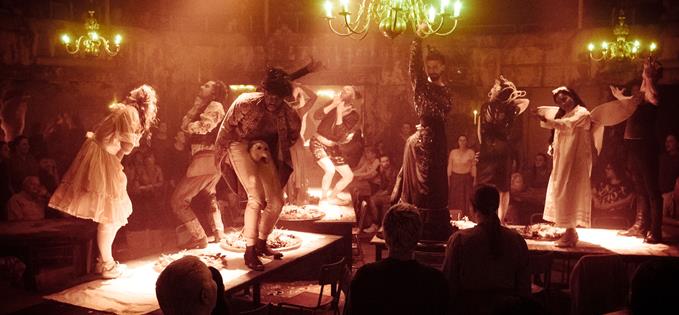 Let's party like we're all going to hell in a handcart
Let's party like we're all going to hell in a handcart












